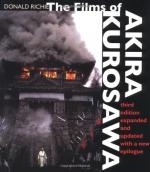|
This section contains 4,265 words (approx. 15 pages at 300 words per page) |

|
SOURCE: "Light and Darkness in Rashomon," in Literature/Film Quarterly, Vol. X, No. 2, 1982, pp. 120-29.
[In the following essay, McDonald examines the symbolic representations of man's nature in Rashomon.]
Akira Kurosawa's Rashomon, the winner of both the 1951 Venice Festival Grand Prize and the 1952 Academy Award for Best Foreign Film, has been examined from many perspectives. One Japanese critic points to the non-Japanese qualities of Rashomon and Kurosawa's other major films, and another comments on its fine filmic style. On the other hand, a number of Western critics explore the moral, psychological and social implications of the murder and its consequence. Once asked what Rashomon is about, Kurosawa simply states that the film is about rape and that is all. This statement of his encourages us to read the film in any possible way that will satisfy our critical propensity. No critic has yet approached Rashomon from the vantage...
|
This section contains 4,265 words (approx. 15 pages at 300 words per page) |

|


